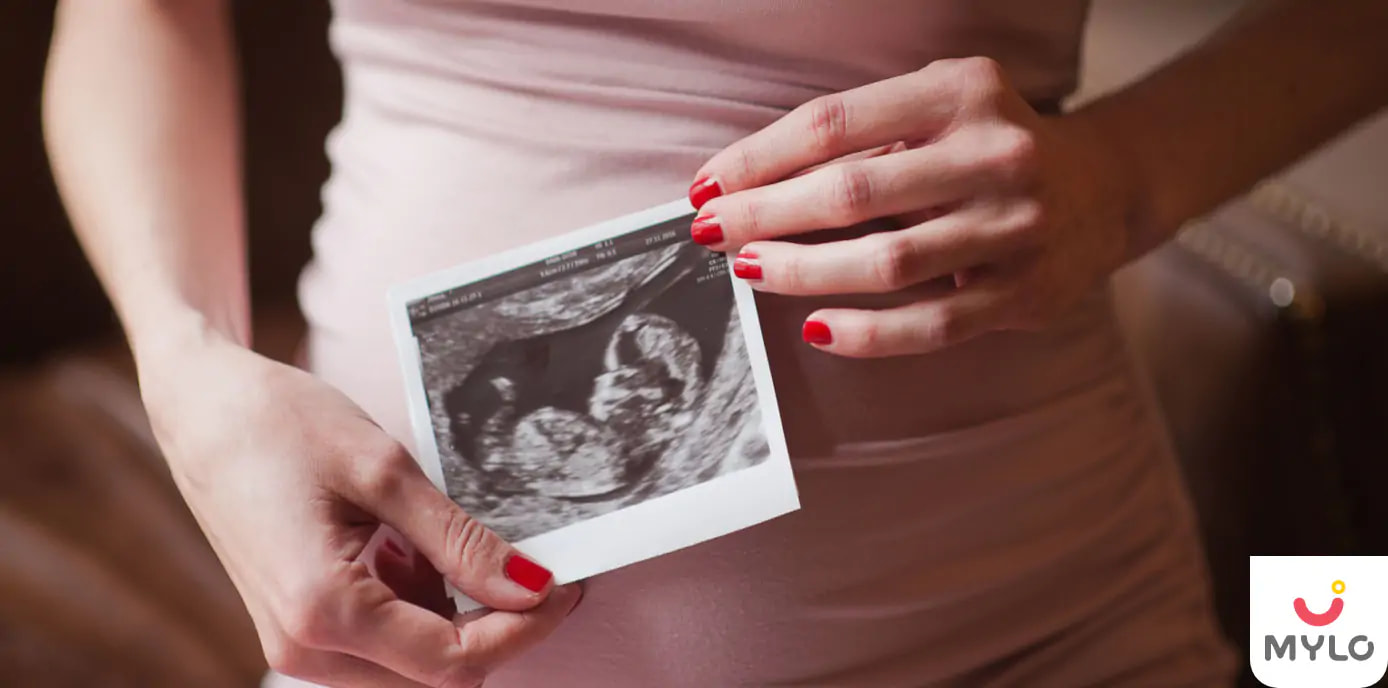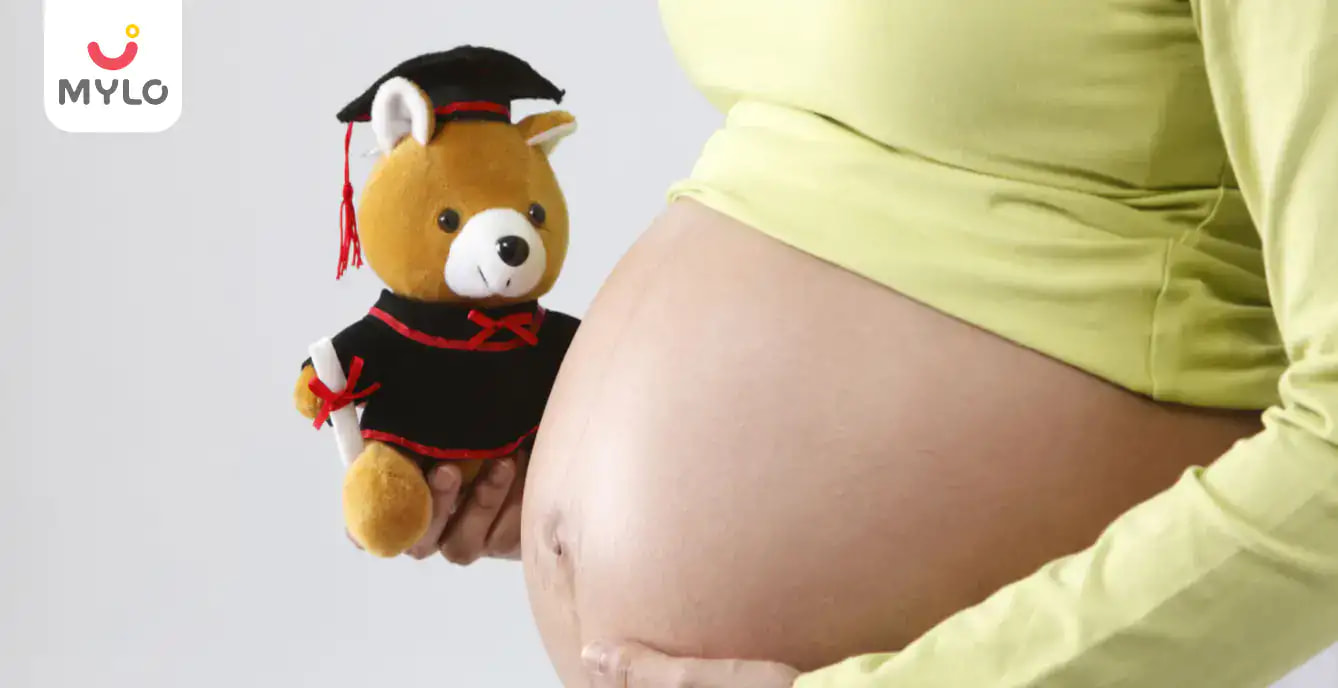Home

Baby Movements

The Science Behind Feeling Baby Movement in the Lower Abdomen
In this Article

Baby Movements
The Science Behind Feeling Baby Movement in the Lower Abdomen
Updated on 3 November 2023
One of the most magical moments during pregnancy is feeling your baby move inside your womb. As your little one grows and develops, you will feel a range of sensations, from subtle flutters to full-on kicks. But have you ever wondered why you might be feeling baby movement in lower abdomen?
In this article, we'll explore the science behind baby kicks in lower abdomen and what it means for you and your growing baby. Get ready to dive into the fascinating world of fetal development!
Is it common to feel baby movements in lower abdomen?
Feeling your baby's movement in the lower abdomen during pregnancy is a normal part of fetal development and indicates that the baby is exploring and developing gross motor and neurological skills. At this point, the baby has discovered that they have arms and legs that can move. So, the movement is similar to how newborns play or explore by moving their limbs around to see what happens. In this case, the "kicking" of the baby happens at different heights and places, and sometimes it feels like it's happening lower in the belly.
The location of the kicking may differ with each trimester and depends on how much space is in the womb. Feeling baby movement in lower abdomen is common, and may even help determine the fetal position. If you have any concerns or questions about your baby's movements, it is recommended that you seek advice from a doctor. Additionally, being part of a pregnant women community can provide social support and help answer any questions or concerns you may have.
The next time you feel baby movement in lower abdomen, don't worry but wonder what could your baby be doing in the tummy. Some possible things your baby might be doing include:
- Kicking
- Flipping over
- Hiccupping
- Flexing
- Exercising their limbs
Does it hurt when the baby kicks you in the lower abdomen?
Baby kicking in lower abdomen at 24 weeks or any other time of pregnancy usually does not hurt. The movements can be caused by the baby turning over, hiccupping, flexing, kicking, and stretching their limbs as they have plenty of room to move around in the womb. However, it is normal to feel discomfort or pain caused by the baby's movements as they grow stronger. The discomfort can be relieved by changing positions.
A baby's kicks or punches are rarely painful, but the sensation can vary. For instance, the kicks become more forceful around the sixth month and may feel like a punch. Additionally, if the baby has hiccups, the woman may feel rhythmic tremors. However, if the infant performs complex acrobatics, the woman can feel baby movements in lower abdomen. This occurs because the amniotic sac still has ample space. If the woman feels a thud-like pressure in her lower abdomen, it's possible that her baby's head, not its feet, is pressing against her belly or back.
It is essential to inform the doctor if the pain is severe, persists, or there are other symptoms or concerns about the baby's movements. Every pregnancy is different, so familiarizing yourself with your baby's unique pattern of movements is important.
You may also like: What Does Quickening Mean and When Does a Pregnant Woman Start Experiencing It?
Is there any relation between baby movement in lower abdomen & gender?
Throughout the nine months of pregnancy, expecting parents like to guess their baby's gender. At a time like this, they tend to give in to myths and hearsay. One such common myth relates to fetal movements in lower abdomen and the baby's gender. There is no conclusive evidence that fetal movements in the lower abdomen can indicate the gender of the baby. However, fetal movements are a sign of healthy development and can vary between boys and girls during pregnancy.
When you could require medical attention?
If a pregnant woman is feeling the baby on lower left side or if the baby is in a breech position, the pregnant woman will feel more kicking in the lower abdomen than if the baby is in a vertex position (head down). But an obstetrician might be able to "flip" the baby before the due date. This is called an external cephalic version, or ECV, and the doctor uses gentle but firm pressure to turn the baby over.
It is recommended to contact a doctor if there is a decrease in the baby's movements after 28 weeks of pregnancy. In general, if you do not feel 10 kicks within two hours when your baby is usually active, you should recount within one to two hours. If you still get the same results (less than 10 kicks in two hours), it is recommended to contact your healthcare provider.
Fetal movement counting is a common way to check the health of an unborn baby and is often referred to as "kick counting". If there is a change in the normal pattern or number of movements, it may indicate stress, and further testing can be done to check the health of the baby. It is important to work with your doctor to keep watch for unusual symptoms and get the best care for you and your baby.
Other reasons for feeling baby movement in lower abdomen
It's possible for you to feel strange movements or sensations in your lower abdomen that may not be baby movements. Everyday body functions like digestion can cause these sensations. Even gas or an upset stomach can be to blame. If a woman knows what might be causing these movements, she can decide if it needs to be treated or if she should go to the doctor.
1. Digestion
When a person eats, their digestive system muscles move the food from the stomach to the intestines. These muscles might move right after eating or even a few hours later, causing movements in the lower abdomen.
2. Irriatable bowel syndrome
Irritable bowel syndrome or IBS is a common gastrointestinal disorder that can cause movements in the lower abdomen. The most common symptom of IBS is lower abdominal pain that is less severe after a bowel movement.
3. Inflammatory bowel disease
Inflammatory bowel disease or IBD a pulling or movement sensation in the lower abdomen. IBD is a group of chronic disorders that cause inflammation in the intestines, including Crohn's disease, ulcerative colitis, and microscopic colitis.
3. Muscle spasms
While it's common to experience muscle spasms in arms and legs, you may have them in your abdomen as well. Muscle strain or overuse can cause these involuntary contractions.
5. Phantom kicks
Phantom kicks are sensations similar to baby movements in lower abdomen and can be felt or seen across the abdomen. They occur after giving birth or experiencing pregnancy loss and mimic the flutters felt during pregnancy.
6. Intestinal obstruction
From the stomach, digested food particles travel through a long line of intestines and organs before leaving the human body as stool. Sometimes, this digestive path can get blocked. The blockage could be partial or complete. A woman may have several symptoms when the blockage happens, including muscle cramps that feel like baby movement.
7. Diverticulitis
Diverticulitis is a problem with the digestive system. It causes unpleasant symptoms like bloating, diarrhea, and inability to go to the bathroom. It can also hurt the stomach and cramp up, which may feel like movement.
The Bottomline
In conclusion, feeling baby movement in lower abdomen is a common and exciting experience for expectant mothers. This sensation is caused by the growing baby's movements and can be felt as early as the second trimester. It is important to note that every pregnancy is different, and some women may not feel movement until later on. If you have concerns about your baby's movement or think something else might be causing baby movements in lower abdomen, it is always best to consult with your healthcare provider.
References
1. Linde A, Georgsson S, Pettersson K, Holmström S, Norberg E, Rådestad I. (2016). Fetal movement in late pregnancy - a content analysis of women's experiences of how their unborn baby moved less or differently. BMC Pregnancy Childbirth.
2. Carlberg DJ, Lee SD, Dubin JS. (2016). Lower Abdominal Pain. Emerg Med Clin North Am.
Tags
The Science Behind Feeling Baby Movement in the Lower Abdomen in Hindi,The Science Behind Feeling Baby Movement in the Lower Abdomen in Tamil, The Science Behind Feeling Baby Movement in the Lower Abdomen in Telugu, The Science Behind Feeling Baby Movement in the Lower Abdomen in Bengali



Written by
Priyanka Verma
Priyanka is an experienced editor & content writer with great attention to detail. Mother to an 11-year-old, she's a ski
Read MoreGet baby's diet chart, and growth tips

Related Articles
Related Topics
RECENTLY PUBLISHED ARTICLES
our most recent articles

Diet & Nutrition
গর্ভাবস্থায় আলুবোখরা: উপকারিতা ও ঝুঁকি | Prunes During Pregnancy: Benefits & Risks in Bengali

Diet & Nutrition
গর্ভাবস্থায় হিং | ঝুঁকি, সুবিধা এবং অন্যান্য চিকিৎসা | Hing During Pregnancy | Risks, Benefits & Other Treatments in Bengali

Women Specific Issues
স্তনের উপর সাদা দাগ: লক্ষণ, কারণ এবং চিকিৎসা | White Spots on Nipple: Causes, Symptoms, and Treatments in Bengali

Diet & Nutrition
গর্ভাবস্থায় পোহা: উপকারিতা, ধরণ এবং রেসিপি | Poha During Pregnancy: Benefits, Types & Recipes in Bengali

Diet & Nutrition
গর্ভাবস্থায় মাছ: উপকারিতা এবং ঝুঁকি | Fish In Pregnancy: Benefits and Risks in Bengali

Diet & Nutrition
গর্ভাবস্থায় রেড ওয়াইন: পার্শ্ব প্রতিক্রিয়া এবং নির্দেশিকা | Red Wine During Pregnancy: Side Effects & Guidelines in Bengali
- ইনার থাই চ্যাফিং: কারণ, উপসর্গ এবং চিকিৎসা | Inner Thigh Chafing: Causes, Symptoms & Treatment in Bengali
- গর্ভাবস্থায় ব্রাউন রাইস: উপকারিতা ও সতর্কতা | Brown Rice During Pregnancy: Benefits & Precautions in Bengali
- Velamentous Cord Insertion - Precautions, Results & Safety
- Unlock the Secret to Flawless Skin: 7 Must-Have Qualities in a Face Serum
- Unlock the Secret to Radiant Skin: How Vitamin C Serum Can Transform Your Complexion
- Gender No Bar: 10 Reasons Why Everyone Needs a Body Lotion
- Unlock the Secret to Radiant Skin How to Choose the Perfect Body Lotion for Your Skin Type
- Top 10 Reasons to Apply a Body Lotion After Every Bath
- Communication in Toddlers: Milestones & Activities
- How to Improve Vocabulary for Toddlers?
- A Comprehensive Guide to Understanding Placenta Accreta
- Vulvovaginitis in Toddlers Causes, Symptoms and Treatment
- A Comprehensive Guide to Understanding Cerebral Palsy in Children
- Bitter Taste in Mouth During Pregnancy: Understanding the Causes and Remedies


AWARDS AND RECOGNITION

Mylo wins Forbes D2C Disruptor award

Mylo wins The Economic Times Promising Brands 2022
AS SEEN IN

- Mylo Care: Effective and science-backed personal care and wellness solutions for a joyful you.
- Mylo Baby: Science-backed, gentle and effective personal care & hygiene range for your little one.
- Mylo Community: Trusted and empathetic community of 10mn+ parents and experts.
Product Categories
baby carrier | baby soap | baby wipes | stretch marks cream | baby cream | baby shampoo | baby massage oil | baby hair oil | stretch marks oil | baby body wash | baby powder | baby lotion | diaper rash cream | newborn diapers | teether | baby kajal | baby diapers | cloth diapers |








